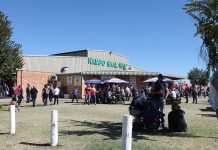Kynoch Fertilizer recently imported fertiliser blending facilities worth R100 million in an environment of low business confidence.
The Farmsecure Group bought Kynoch last year from Yara International and recently imported two new liquid and granular fertiliser facilities from the US. The plants have been erected in Viljoenskroon and Durban.
These investments come at a time when confidence in the agribusiness sector is slipping, as indicated by the Agribusiness Confidence Index, compiled by the Agricultural Business Chamber. The index slipped by 9% between the second and third quarters to reach its lowest level for 2011.
Overall, fertiliser demand is not increasing in South Africa either, and has been stable for over 20 years, fluctuating by a few percentage points each year depending on planted hectares.
“Although there is no increase in South African fertiliser demand, and the economic climate is tough, the world remains hungry, and food production needs to double by 2050, based on the current population growth and energy demands,” said Gordon Hesom, chief executive of Kynoch Fertilizer.
Hesom said the investment in the new facilities was not based on an increasing overall demand, but on servicing the Kynoch client base and improving supply chain logistics. “Logistics costs in agriculture in South Africa (and in most of Africa) are very high. It is a devastating double-edged sword. It increases the farm gate price of inputs, and decreases the farm gate value of agricultural produce. We strongly believe that the survival and prosperity of agricultural value chains will depend on optimisation across the full chain of farming inputs, farming operations, and farming produce.”
The facilities are on sites that would optimise the entire agricultural supply chain. “In some areas we will move grain or fruit from the production area to the port for export, and we will use the same logistics infrastructure to move fertiliser back into those areas. Thus, the farming communities there get the benefit of reduced logistics costs,” Hesom explained.
Carel Bezuidenhout, professor in agricultural engineering at the University of KZN, stressed the importance of tightening supply chain logistics. “Logistics are critically important,” he said. “If full trucks pass each other in different directions on the road, carrying the same product, then you know the supply chain is broken.” – Robyn Joubert








